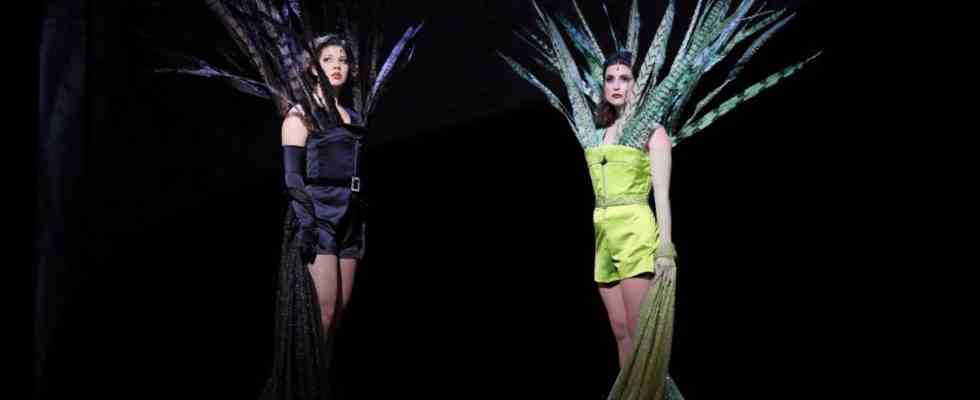shot and finish. Mata Hari, wearing hot pants and a feather headdress, collapses. Starting with the final bang is a tried and true author trick. How did the worst come about? In this musical case: Why was the legendary nude dancer and double spy Margaretha Geertruida “Griet” Zelle-MacLeod aka Mata Hari executed in France towards the end of the First World War?
For the dramaturgy, the question is more important: How far back do you look? Do you want to clarify the guilt of the agent divas in the deaths of thousands of soldiers and their love affairs, including the German crown prince, as a black-and-white video of a statement from the criminal trial suggests? Or do you want to psychologize their innermost suffering as a drive for freedom and fame in a kind of family constellation? Unfortunately, the team of the new musical “Mata Hari” at the Gärtnerplatztheater chose the latter. Like hatching a plan to steal top-secret papers from Secret Service headquarters and coming out at the end of the tunnel in Social Services.
Mata Hari in film or on stage for the umpteenth time – “Mission impossible”? Not necessarily. Exposures of imposters (like Anna Sorokin), war winners, and hype figures are popular. The Gärtnerplatztheater did well to put together a master team again, above all Kevin Schroeder for the book and lyrics, whose German translation of “Hamilton” from the New York Times was applauded.
So, what does the audience want from Mata Hari (to quote the trailer of the classic film starring Greta Garbo): “Affairs. Intrigues. Betrayals.” But you stop at Gärtnerplatz, before Mata Hari gets started in Paris as a star and spy. For fear of clichés (in musicals of all things!). Instead, it shows Griet’s (Florine Schnitzel) everyday life with her captain-husband on a mission in Java, domestic violence, nasty society aunts (very strict: Dagmar Hellberg) and the screams of the baby she rejected (“Cut it out!”).
The question: How would Mata Hari be as a pop star today?
The plan was to spice up the soul striptease with a really crazy idea, an abstract emotion bubble with a second main character: how would Mata Hari be as a pop star today? Stephen Sondheim pupil Marc Schubring not only wrote the theater music, with which the great house orchestra exudes a bit of Hollywood adventure exoticism, but also hits for the first time. He thought. Because the expected pop and rock potpourri of Lady Gaga glamor (“Fakebitch”), Sarah Connor ballad, Rammstein-Rumms (with little flamethrowers), Billy Eilish James Bond soul (to the sharp spy ballet with androgynously slippery frogman women) and Marianne Rosenberg Schlagerdisco shows once again: pop is not a building block, pop is an attitude. The purchased sound cement from star producer Kraans de Lutin also helps (seed) nothing – especially his basses are pale.
Ann Sophie Dürmeyer (zero points for Germany at ESC 2015) has great moments as Mata-Stari, but never a hint of the claimed “goddess”. It’s the same with Florine Schnitzel as Griet, who gives everything when playing and singing, but was much sexier as a conservative granddaughter in the senior musical “Rockin’ Rosie”. But the moments when the two meet, exchange looks, recognize who they were and could be are nice (Zelle has always regarded her artificial character Mata Hari as an independent person). Director Isabelle Gregor bravely put the tricky construct together. And Adam Cooper’s choreography is snazzy (there are blue-skinned goddesses in wayang-puppetry-esque yet modern dance). But seduction without sexiness, espionage without sophistication, a myth without a myth – that doesn’t catch fire.

